Saturday, August 14, 2010
On this solemn Feast of the Assumption of the Virgin Mary, listen to this beautiful Ave Maria as you pray through the scripture reflection: "God who is mighty"
"God who is mighty has done great things for me"
It isn’t often that we mark the anniversary of a loved one’s death with much fanfare. Normally, we may visit their gravesite, request that a Mass be offered in their memory, share a few stories on the day of the anniversary, or examine pictures of them. But for the most part, we recall their parting quietly and turn to our memories of their life with us.
However, this Sunday August 15th, the Solemnity of the Assumption of the Virgin Mary, is a solemn major feast in the Catholic Church which marks not the life of Mary but rather the transition of her life here to that of eternal life. There is strong belief that Mary did indeed die but, like her son, entered eternal life with body and soul. Unlike the resurrection of Jesus, however, there are no claimed witnesses to Mary’s assumption into heaven. Tradition states an empty tomb was discovered at the burial site of Mary in Jerusalem. No relics of Mary have ever been claimed, no charge that her body was stolen, but the truth of the specific event comes from the days of the early Church. Likely built upon the memories of the apostles and earliest of Christians of which there are early records.
It is a dogma (infallible teaching) which is not stated specifically in the scriptures. But it is a logical development of thought. Yet, it is problematic for our Protestant brethren and perhaps for some Catholics as well. Though held for centuries, it was not formally defined as an infallible truth until 1950 when Pope Pius XII proclaimed: “The Immaculate Mother of God, the ever-virgin Mary, having completed the course of her earthly life, was assumed body and soul into heaven.” (Munificentissimus Deus). How can we best understand its significance? Perhaps, through Mary herself.
The one and only true Savior of the world, the Second Person of the Blessed Trinity, the Word of God made flesh among us, entered this world at a specific time and century in human history, in a precise geographical location on earth, in a particular religious culture of the Jews, and through the normal, biological process of the fertilization of a human egg by a sperm, within the womb of a human mother chosen for this singular purpose. The egg was Mary’s and the sperm would have had to be divinely created, yet totally human otherwise Mary could have never conceived as she did.
Elizabeth’s greeting to Mary in the Gospel of Luke 1: 39-56 for today’s solemn feast, “Blessed are you among women and blessed is the fruit of your womb . . .” was indeed an understatement of Biblical proportions. For us Catholics and for other Christians of the Orthodox faith, Mary is not an afterthought, an appendage, an incidental human person used for a function and then forgotten. She is the one through whom the promise given to Abraham, Moses and the Prophets was ultimately fulfilled in the birth of her son, the enfleshed Word of God. For that reason alone, she would deserve our great respect if not more. Her cooperation with God’s plan was pivotal to salvation.
The first reading from Revelation 11: 19; 12:1 – 6, 10 speaks of a “great sign” a “woman clothed with the sun, with the moon under her feet, and on her head a crown of twelve stars . . .” The parallels with Jesus and Mary’s role are significant. So, we look to this somewhat mystical image of a woman and there see Mary’s role symbolized.
The Gospel passage from Luke 1: 39-56 is, I feel, one of the most joy-filled in the entire New Testament. You can not read this event without a smile on your face or capture some portion of what these two women, Mary and Elizabeth, must have experienced. . Mary becomes the first and most personal of all messengers of the good news. God has finally, after centuries of hope, come to visit his people. And she is the human door through which God has entered among us. So, Mary becomes the model disciple that calls us all to be heralds of the good news of salvation – a true evangelizer!
It is logical to assume, that her role in salvation history, her consistent faithfulness to what God asked of her, her purity, her courage, her trust – all of which we hear about in the Gospels, particularly that of Luke and John, would have brought some appropriate reward. But, what would be most fitting for such an exemplary model of faith?
In 1854, when Pope Pius IX proclaimed the dogma of the Immaculate Conception of Mary, he referred to the Gospel story of the Annunciation and to the words of the angel we read in the Gospel of Luke. The angel did not address Mary by name. He did not say, “Hail Mary.” He addressed her, “Hail, full of grace!” and “blessed among women.” It is a way of the scriptures telling us the state of Mary’s soul. She was “filled with” the perfect grace of God already – there was no sin on her. She was, in fact, called to her special mission because she was created without sin. The perfect mother for the perfect son. It is logical.
The Assumption of Mary body and soul into heaven is the logical reward for this person created without sin that remained sinless all of her earthly life. Where Mary has gone, we see our hope as well.
All of this may be quite a stretch for some. But there is no doubt that it is our faith in Jesus Christ, and faith in him alone that will bring us salvation. Mary is not divine. She was and remains a human being, albeit in some altered state of glorification, as is Jesus himself, and we can probably assume that she would be the last one to claim any credit for the honor she has been given.
The Catholic belief on Mary, as the rest of Catholic theology, tradition, spirituality, does not take away from Protestantism. In fact, for those who enter the Church from another Christian tradition, I think they quickly find that the road to the Catholic faith does not take away from – it adds to what they already believe but now come to see in its fullness. This Marian teaching implies the sanctity of human life, God's special favor for the poor, the healing of injustice in the world, and the need for reconciliation between cultures and peoples.
There is no doubt, then, that the Catholic Church has a love affair with the mother of Jesus. Cathedrals, Basilicas, religious shrines, pilgrimage sites such as Lourdes and Fatima, countless parish Churches including my own, claimed apparitions of the Blessed Mother, novenas, rosaries, prayers, etec, all portray, “The greatness of the Lord” expressed through this lowly maiden and greatest of all saints in heaven.
However, this Sunday August 15th, the Solemnity of the Assumption of the Virgin Mary, is a solemn major feast in the Catholic Church which marks not the life of Mary but rather the transition of her life here to that of eternal life. There is strong belief that Mary did indeed die but, like her son, entered eternal life with body and soul. Unlike the resurrection of Jesus, however, there are no claimed witnesses to Mary’s assumption into heaven. Tradition states an empty tomb was discovered at the burial site of Mary in Jerusalem. No relics of Mary have ever been claimed, no charge that her body was stolen, but the truth of the specific event comes from the days of the early Church. Likely built upon the memories of the apostles and earliest of Christians of which there are early records.
It is a dogma (infallible teaching) which is not stated specifically in the scriptures. But it is a logical development of thought. Yet, it is problematic for our Protestant brethren and perhaps for some Catholics as well. Though held for centuries, it was not formally defined as an infallible truth until 1950 when Pope Pius XII proclaimed: “The Immaculate Mother of God, the ever-virgin Mary, having completed the course of her earthly life, was assumed body and soul into heaven.” (Munificentissimus Deus). How can we best understand its significance? Perhaps, through Mary herself.
The one and only true Savior of the world, the Second Person of the Blessed Trinity, the Word of God made flesh among us, entered this world at a specific time and century in human history, in a precise geographical location on earth, in a particular religious culture of the Jews, and through the normal, biological process of the fertilization of a human egg by a sperm, within the womb of a human mother chosen for this singular purpose. The egg was Mary’s and the sperm would have had to be divinely created, yet totally human otherwise Mary could have never conceived as she did.
Elizabeth’s greeting to Mary in the Gospel of Luke 1: 39-56 for today’s solemn feast, “Blessed are you among women and blessed is the fruit of your womb . . .” was indeed an understatement of Biblical proportions. For us Catholics and for other Christians of the Orthodox faith, Mary is not an afterthought, an appendage, an incidental human person used for a function and then forgotten. She is the one through whom the promise given to Abraham, Moses and the Prophets was ultimately fulfilled in the birth of her son, the enfleshed Word of God. For that reason alone, she would deserve our great respect if not more. Her cooperation with God’s plan was pivotal to salvation.
The first reading from Revelation 11: 19; 12:1 – 6, 10 speaks of a “great sign” a “woman clothed with the sun, with the moon under her feet, and on her head a crown of twelve stars . . .” The parallels with Jesus and Mary’s role are significant. So, we look to this somewhat mystical image of a woman and there see Mary’s role symbolized.
The Gospel passage from Luke 1: 39-56 is, I feel, one of the most joy-filled in the entire New Testament. You can not read this event without a smile on your face or capture some portion of what these two women, Mary and Elizabeth, must have experienced. . Mary becomes the first and most personal of all messengers of the good news. God has finally, after centuries of hope, come to visit his people. And she is the human door through which God has entered among us. So, Mary becomes the model disciple that calls us all to be heralds of the good news of salvation – a true evangelizer!
It is logical to assume, that her role in salvation history, her consistent faithfulness to what God asked of her, her purity, her courage, her trust – all of which we hear about in the Gospels, particularly that of Luke and John, would have brought some appropriate reward. But, what would be most fitting for such an exemplary model of faith?
In 1854, when Pope Pius IX proclaimed the dogma of the Immaculate Conception of Mary, he referred to the Gospel story of the Annunciation and to the words of the angel we read in the Gospel of Luke. The angel did not address Mary by name. He did not say, “Hail Mary.” He addressed her, “Hail, full of grace!” and “blessed among women.” It is a way of the scriptures telling us the state of Mary’s soul. She was “filled with” the perfect grace of God already – there was no sin on her. She was, in fact, called to her special mission because she was created without sin. The perfect mother for the perfect son. It is logical.
The Assumption of Mary body and soul into heaven is the logical reward for this person created without sin that remained sinless all of her earthly life. Where Mary has gone, we see our hope as well.
All of this may be quite a stretch for some. But there is no doubt that it is our faith in Jesus Christ, and faith in him alone that will bring us salvation. Mary is not divine. She was and remains a human being, albeit in some altered state of glorification, as is Jesus himself, and we can probably assume that she would be the last one to claim any credit for the honor she has been given.
The Catholic belief on Mary, as the rest of Catholic theology, tradition, spirituality, does not take away from Protestantism. In fact, for those who enter the Church from another Christian tradition, I think they quickly find that the road to the Catholic faith does not take away from – it adds to what they already believe but now come to see in its fullness. This Marian teaching implies the sanctity of human life, God's special favor for the poor, the healing of injustice in the world, and the need for reconciliation between cultures and peoples.
There is no doubt, then, that the Catholic Church has a love affair with the mother of Jesus. Cathedrals, Basilicas, religious shrines, pilgrimage sites such as Lourdes and Fatima, countless parish Churches including my own, claimed apparitions of the Blessed Mother, novenas, rosaries, prayers, etec, all portray, “The greatness of the Lord” expressed through this lowly maiden and greatest of all saints in heaven.
Father Tim
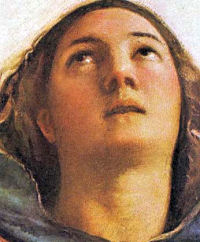
 15th
15th 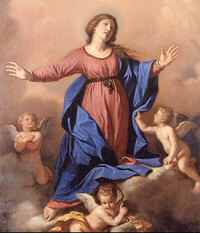 Now toward the end of the summer season, at a time when fruits are ripe in the gardens and fields, the Church celebrates the most glorious "harvest festival" in the Communion of Saints. Mary, the supremely blessed one among women, Mary, the most precious fruit which has ripened in the fields of God's kingdom, is today taken into the granary of heaven.
Now toward the end of the summer season, at a time when fruits are ripe in the gardens and fields, the Church celebrates the most glorious "harvest festival" in the Communion of Saints. Mary, the supremely blessed one among women, Mary, the most precious fruit which has ripened in the fields of God's kingdom, is today taken into the granary of heaven. 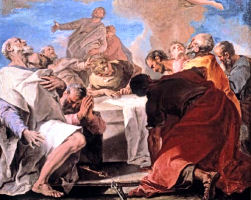 At the Council of Chalcedon in 451, when bishops from throughout the Mediterranean world gathered in Constantinople, Emperor Marcian asked the Patriarch of Jerusalem to bring the relics of Mary to Constantinople to be enshrined in the capitol. The patriarch explained to the emperor that there were no relics of Mary in Jerusalem, that "Mary had died in the presence of the apostles; but her tomb, when opened later . . . was found empty and so the apostles concluded that the body was taken up into heaven."
At the Council of Chalcedon in 451, when bishops from throughout the Mediterranean world gathered in Constantinople, Emperor Marcian asked the Patriarch of Jerusalem to bring the relics of Mary to Constantinople to be enshrined in the capitol. The patriarch explained to the emperor that there were no relics of Mary in Jerusalem, that "Mary had died in the presence of the apostles; but her tomb, when opened later . . . was found empty and so the apostles concluded that the body was taken up into heaven." 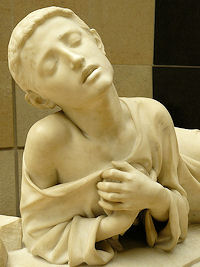 Tarcisius was a twelve-year-old acolyte during one of the fierce Roman persecutions of the third century, probably during that of Valerian. Each day, from a secret meeting place in the catacombs where Christians gathered for Mass, a deacon would be sent to the prisons to carry the Eucharist to those Christians condemned to die. At one point, there was no deacon to send and so St. Tarcisius, an acolyte, was sent carrying the "Holy Mysteries" to those in prison.
Tarcisius was a twelve-year-old acolyte during one of the fierce Roman persecutions of the third century, probably during that of Valerian. Each day, from a secret meeting place in the catacombs where Christians gathered for Mass, a deacon would be sent to the prisons to carry the Eucharist to those Christians condemned to die. At one point, there was no deacon to send and so St. Tarcisius, an acolyte, was sent carrying the "Holy Mysteries" to those in prison. 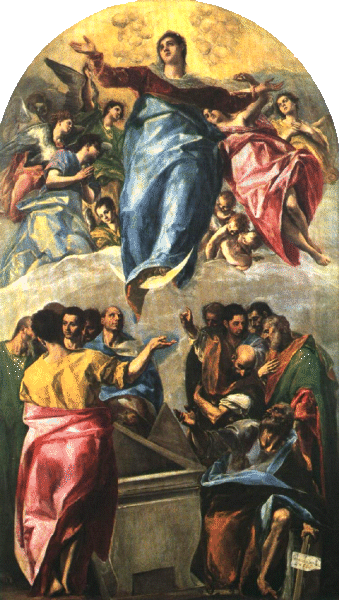


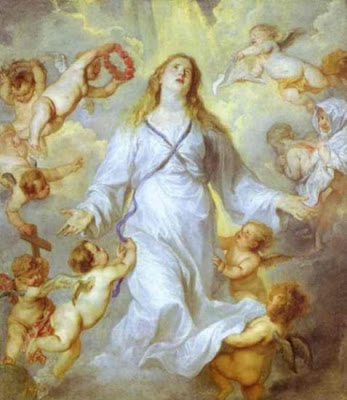
 If you can't see the picture, please click on the links above.
Christians of both East and West have, from very early times, blessed herbs and fruit on the Feast of the Assumption. Thus blessed, these creatures become sacramentals of the Church and portents of divine protection from dangers to soul and body. In some places the herbs were placed on the altar, and even beneath the altar linens, so that from this proximity to the Most Holy Eucharist they might receive a special hallowing, beyond that conferred by the blessing prayers of the Church.
If you can't see the picture, please click on the links above.
Christians of both East and West have, from very early times, blessed herbs and fruit on the Feast of the Assumption. Thus blessed, these creatures become sacramentals of the Church and portents of divine protection from dangers to soul and body. In some places the herbs were placed on the altar, and even beneath the altar linens, so that from this proximity to the Most Holy Eucharist they might receive a special hallowing, beyond that conferred by the blessing prayers of the Church.
